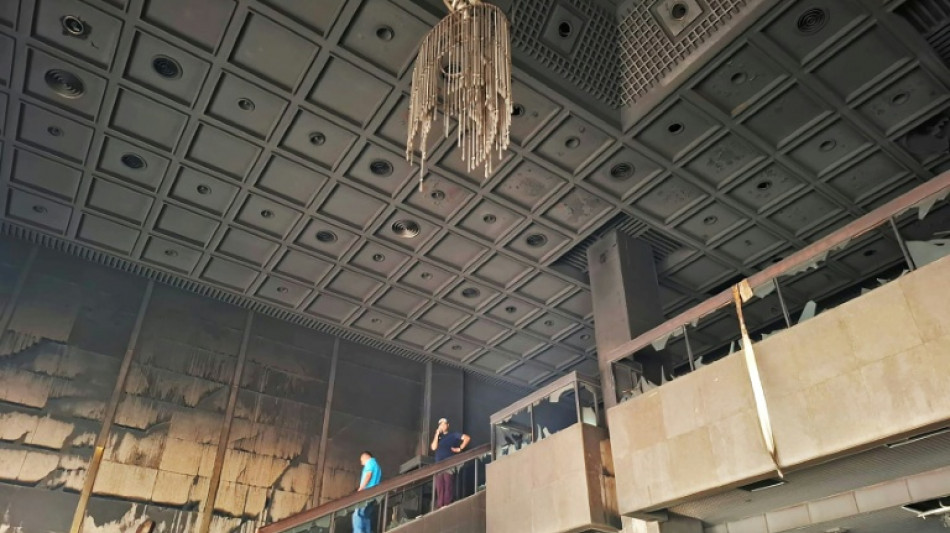
-
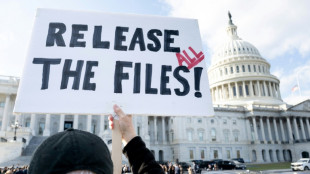 US lawmakers set for explosive vote on Epstein files
US lawmakers set for explosive vote on Epstein files
-
Gianfranco Rosi: the slow documentary maker in a frantic world

-
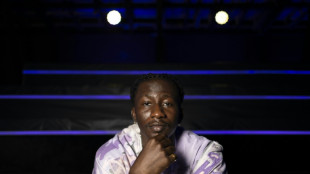 P.Priime, Nigeria's young leading Afrobeats producer
P.Priime, Nigeria's young leading Afrobeats producer
-
Merz, Macron to push for European digital 'sovereignty'
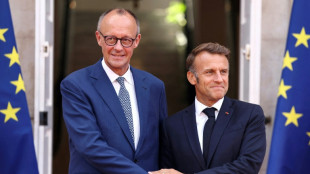
-
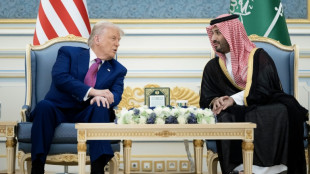 Trump hosts Saudi prince for first time since Khashoggi killing
Trump hosts Saudi prince for first time since Khashoggi killing
-
Tonga's Katoa out of NRL season after brain surgery

-
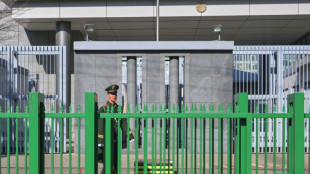 Japan warns citizens in China over safety amid Taiwan row
Japan warns citizens in China over safety amid Taiwan row
-
In Somalia, a shaky front line barely holds back the 'dogs of war'
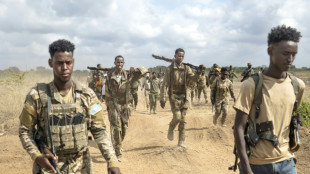
-
 Shares in 'Baby Shark' studio jump on market debut
Shares in 'Baby Shark' studio jump on market debut
-
Thunder breeze past Pelicans, Pistons overpower Pacers

-
 Grieving Cowboys remember Kneeland, defeat Raiders
Grieving Cowboys remember Kneeland, defeat Raiders
-
Loaf behind bars: Aussie inmate says Vegemite a human right

-
 In film's second act, 'Wicked' goes beyond Broadway musical
In film's second act, 'Wicked' goes beyond Broadway musical
-
Asian markets track Wall St down with Nvidia, US jobs in view
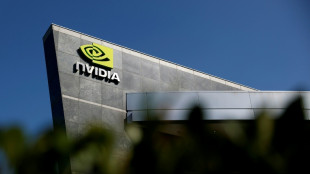
-
 Scott Boland: the best 'spare' fast bowler around
Scott Boland: the best 'spare' fast bowler around
-
Fire and Ashes: England bank on fast bowling barrage in Australia

-
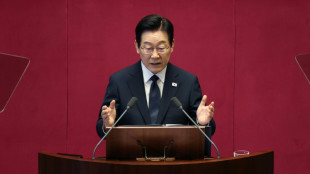 North Korea says Seoul-US sub deal will trigger 'nuclear domino' effect
North Korea says Seoul-US sub deal will trigger 'nuclear domino' effect
-
Education for girls hit hard by India's drying wells
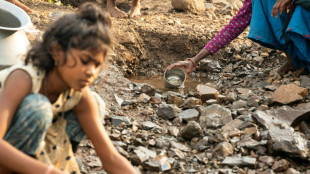
-
 Haitian gangs getting rich off murky market for baby eels
Haitian gangs getting rich off murky market for baby eels
-
Trump says will talk to Venezuela's Maduro, 'OK' with US strikes on Mexico
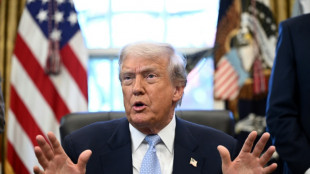
-
 Oscar Piastri wins Australia's top sports honour
Oscar Piastri wins Australia's top sports honour
-
'Severely restricted': Russia's Saint Petersburg faces cultural crackdown
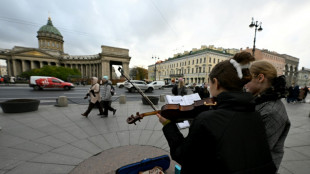
-
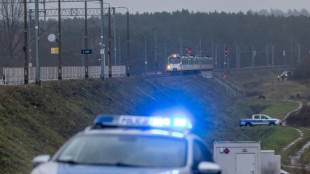 Polish PM denounces 'sabotage' of railway supply line to Ukraine
Polish PM denounces 'sabotage' of railway supply line to Ukraine
-
UK toughens asylum system with radical overhaul

-
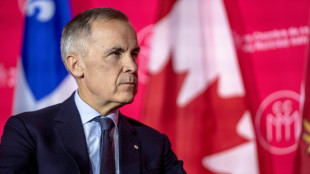 Carney's Liberals pass budget, avoiding snap Canada election
Carney's Liberals pass budget, avoiding snap Canada election
-
LeBron back in training, edges closer to Lakers return

-
 Climate talks run into night as COP30 hosts seek breakthrough
Climate talks run into night as COP30 hosts seek breakthrough
-
Germany and Netherlands lock up World Cup spots in style

-
 Germany's Woltemade hopes for 2026 World Cup spot after scoring again
Germany's Woltemade hopes for 2026 World Cup spot after scoring again
-
Germany 'send message' with Slovakia rout to reach 2026 World Cup

-
 Trump unveils fast-track visas for World Cup ticket holders
Trump unveils fast-track visas for World Cup ticket holders
-
Netherlands qualify for World Cup, Poland in play-offs

-
 Germany crush Slovakia to qualify for 2026 World Cup
Germany crush Slovakia to qualify for 2026 World Cup
-
Stocks gloomy on earnings and tech jitters, US rate worries

-
 'In it to win it': Australia doubles down on climate hosting bid
'In it to win it': Australia doubles down on climate hosting bid
-
Former NFL star Brown could face 30 yrs jail for shooting case: prosecutor

-
 Fate of Canada government hinges on tight budget vote
Fate of Canada government hinges on tight budget vote
-
New research measures how much plastic is lethal for marine life

-
 Mbappe, PSG face off in multi-million lawsuit
Mbappe, PSG face off in multi-million lawsuit
-
EU defends carbon tax as ministers take over COP30 negotiations

-
 McCartney to release silent AI protest song
McCartney to release silent AI protest song
-
Stocks tepid on uncertainty over earnings, tech rally, US rates

-
 Louvre shuts gallery over ceiling safety fears
Louvre shuts gallery over ceiling safety fears
-
'Stranded, stressed' giraffes in Kenya relocated as habitats encroached

-
 US Supreme Court to hear migrant asylum claim case
US Supreme Court to hear migrant asylum claim case
-
Western aid cuts could cause 22.6 million deaths, researchers say

-
 Clarke hails Scotland 'legends' ahead of crunch World Cup qualifier
Clarke hails Scotland 'legends' ahead of crunch World Cup qualifier
-
S.Africa says 'suspicious' flights from Israel show 'agenda to cleanse Palestinians'

-
 South Korea pledges to phase out coal plants at COP30
South Korea pledges to phase out coal plants at COP30
-
Ex-PSG footballer Hamraoui claims 3.5m euros damages against club


The factors behind violent unrest in Nepal
Nepali youth, digitally savvy but bowed down by unemployment and limited opportunities, hit a breaking point this week, furious at an elderly ruling class they see as out of touch.
Dissatisfaction has grown at political instability, corruption, and slow economic development in the Himalayan nation of 30 million people.
That escalated into street anger on Monday, triggered by a government ban on social media -- later overturned -- with at least 19 people killed as police sought to crush protests.
The resignation of 73-year-old Prime Minister KP Sharma Oli failed to quell the anger of protesters, who set fire to parliament and a string of other government and political party buildings.
Many said that the social media ban was only the spark for protests.
Here are some of the factors that toppled the government.
- Economic woes -
The World Bank says a "staggering" 82 percent of Nepal's workforce is in informal employment, "far higher than global and regional averages".
Remittances are crucial for Nepal's economy, equalling a third of the country's GDP last year and the fourth-highest rate globally, according to the World Bank.
Social media is a key tool in keeping in touch with relatives abroad.
"Nepal's reliance on remittances... has been central to the country's growth but has not translated into quality jobs at home, reinforcing a cycle of lost opportunities and the continued departure of many Nepalis abroad in search of employment," the World Bank said in its latest country report.
The economy has picked up; real GDP grew by 4.9 percent in the first half of the 2025 financial year -- from 4.3 percent in the same period in 2024, mainly due to the agricultural and industrial sectors.
Nepal categorises young people as aged between 16-40, totalling more than 12 million people or nearly 43 percent overall, according to government statistics.
"With around 500,000 young people joining the workforce every year in Nepal, the urgency to create jobs that lift families out of poverty and drive sustainable development has never been more critical," said World Bank Vice President for South Asia, Johannes Zutt, after a visit last week.
- Corruption -
The rights group Transparency International ranks Nepal 107 out of 180 countries.
Videos contrasting the struggles of ordinary Nepalis with the children of politicians flaunting luxury goods and expensive vacations have gone viral on TikTok.
Puja Manni, a 23-year-old woman who has worked abroad, said the excesses of the ruling elite had been "exposed through social media".
Among the young, there was widespread dissatisfaction with leaders who have held power for decades.
The country became a federal republic in 2008 after a decade-long civil war and a peace deal that saw the Maoists brought into government and the abolishment of the monarchy.
Since then, a revolving door of ageing prime ministers and a culture of horse-trading have fuelled public perception that the government is out of touch.
- Fear at loss of rights -
Nepal's National Human Rights Commission warned the social media ban undermined "the spirit of democratic governance".
Santosh Sigdel, of Digital Rights Nepal, said the ban was a "slippery slope", while the Kathmandu Post said it "touched a raw nerve" with an angry youth.
"They use these platforms to vent pent-up frustrations, connect with friends, and keep abreast with the rest of the world," wrote the newspaper, whose offices were torched by a mob Tuesday.
"They were already antsy, fed up with the country's woeful health and education systems, and rampant corruption and nepotism -- so much so that many of them saw no future in the country."
N.AbuHussein--SF-PST
